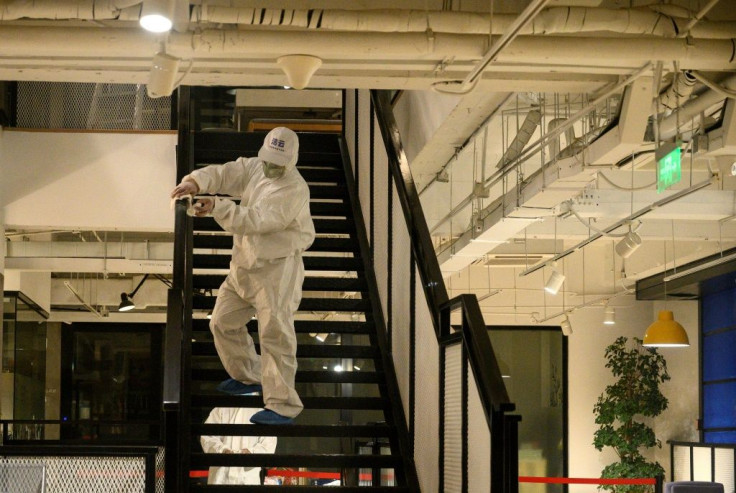Coronavirus Update: Bain Warns China GDP Could Be Slashed By Up To $72 Billion

KEY POINTS
- Bain warned the virus could reduce Chinese GDP by up to $72 billion
- The economic costs from the coronavirus will exceed the financial damage caused by SARS.
- China’s economy now accounts for more than 16% of global GDP
The coronavirus crisis could result in a reduction of 0.2 to 0.5 percentage points from China’s gross domestic product this year, according to an analysis by consultancy Bain & Co.
That is equivalent to a slash of about $43 billion to $72 billion in the country’s GDP.
Bain noted that the economic costs from the coronavirus will exceed the financial damage caused by previous disease outbreaks, including swine flu and severe acute respiratory syndrome, or SARS.
“In financial terms, the biggest difference between this outbreak and SARS is the size of China’s economy, which was [$2 trillion] in 2003. SARS reduced China's GDP by almost 1% or approximately [$14.4 billion]. In 2003, however, China represented just 4% of global GDP,” Bain said.
Bain pointed out that China’s economy is seven times larger today, accounts for more than 16% of global GDP and “plays a critical role in many global supply chains.”
The Bain report, written by Weiwen Han, Karen Harris and Thomas Luedi, noted that while the novel coronavirus appears to be less deadly than SARS -- with a mortality rate of 2%-3% vs. a rate of 6.6% for SARS -- it is far more contagious. The coronavirus already has infected eight times as many people that were sickened during the entire SARS epidemic.
“The resulting economic impact will be severe,” Bain warned. “Both epidemics triggered nationwide containment actions, but this time, the Chinese government acted faster and with much stricter measures, such as a widespread quarantine, nationwide extended public holidays, restrictions on interprovincial travel for some 20 provinces and local transport controls.”
Bain noted that the impact of SARS on China’s economy was short-lived and mostly limited to the second quarter of 2003. China’s GDP growth rate fell by 2 percentage points in that quarter but rebounded during the rest of the year.
“The industries hit hardest by SARS (services) now make up a larger proportion of China’s economy -- 54% today vs. 42% in 2003,” said the report. “And China’s economy was already cooling before this [latest] outbreak, which is a critical difference when compared with its high-growth trajectory in 2003.”
Bain pointed out some other differences that might help mitigate the economic damage from the virus.
“Today’s China is an internet and e-commerce powerhouse,” the report noted. “Robust offline-to-online delivery networks may help bolster consumption, even with millions of Chinese quarantined or on extended public holiday. Many of those same people also can continue working remotely, at least partially offsetting losses in productivity.”
Indeed, the researchers think online consumption could even see long-term benefits “as a result of high growth and accelerated customer acquisition and penetration during the crisis -- if, that is, offline supply chains can keep up and continue to fulfill orders for physical products.”
By sector, essentials like groceries, nondiscretionary consumer products and pharmaceuticals will remain strong, while offline consumption will fare the worst. “Transportation, tourism, entertainment, traditional retailers, real estate, food and beverage, discretionary consumer products, automobiles, and insurance will be hit hard,” Bain said. “In Hong Kong, this will exacerbate the challenge for many of these sectors already hurt by eight months of disruption and unrest.”
Bain also expects to see a short-term decrease in Chinese exports, followed by a global ripple effect. “Multinational corporations will need to make up for gaps in procurement and manufacturing from China and even from suppliers outside China that depend on its goods,” the report said.
Indeed, Bank of China International estimated that the short-term impact on exports will cost $30 billion. “This may also accelerate the ongoing diversification by many multinationals away from China as a sourcing and manufacturing base,” Bain added.
Bain recommends that foreign companies act quickly to cope with this crisis.
“While it is too early to know for sure how severe the human and financial cost of coronavirus will be in China and around the globe… for companies, a wait-and-see approach is often the most damaging move in uncertain times,” Bain warned. “Instead, the companies that will fare best during this crisis and be best positioned during the recovery will be those that act now.”
As of Monday night, China’s National Health Commission said the death toll from the virus had climbed to 1,016 people with 42,638 confirmed cases.
© Copyright IBTimes 2025. All rights reserved.





















